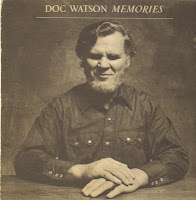Stranger Songs with Mike Regenstreif finds connections and develops themes in various genres. The show is broadcast on CKCU, 93.1 FM, in Ottawa on Tuesdays from 3:30 until 5 pm (Eastern time) and is also available 24/7 for on-demand streaming.
This episode of Stranger Songs was recorded and can be streamed on-demand, now or anytime, by clicking on “Listen Now” at … https://cod.ckcufm.com/programs/595/69695.html
Theme: A Tribute to Doc Watson (1923-2012).
Doc Watson was one of the most influential guitarists and singers of folk and related musical styles of all time. Blind since infancy, Doc was from Deep Gap, North Carolina and began his professional career playing electric guitar in a country and western band in the early 1950s. Doc had a deep repertoire of traditional folk songs and by the 1960s was performing folk music on acoustic guitar and banjo. Doc died in 2012 at age 89.
Doc & Merle Watson- Brown’s Ferry Blues
Doc Watson On Stage (Vanguard)
Doc & Merle Watson- Don’t Let Your Deal Go Down
Doc Watson On Stage (Vanguard)
Bill Garrett- Winters Night
Seems to Me (Borealis)
Jody Stecher- Way Downtown
Going Up On the Mountain (Acoustic Disc)
Michael Jerome Browne- The Coo Coo
Michael Jerome Browne & The Twin Rivers String Band (Borealis)
Si Kahn- To Hear Doc Watson Play
Thanksgiving (Strictly Country)
Doc Watson- Deep River Blues
Doc Watson (Vanguard)
Jean Ritchie & Doc Watson- Go Dig My Grave
Jean Ritchie and Doc Watson At Folk City (Smithsonian Folkways)
Doc & Merle Watson- Freight Train Boogie
Elementary Doctor Watson (Tomato)
Mitch Greenhill & Mayne Smith- Freight Train Blues
Storm Coming (Folklore Productions)
Maria Muldaur with Doc & Merle Watson- Honey Babe Blues
Waitress in a Donut Shop (Reprise)
Ian & Sylvia- Handsome Molly
Ian & Sylvia (Vanguard)
Tom Paxton- Leaving London
The Compleat Tom Paxton (Even Compleater) (Rhino Handmade)
Doc & Richard Watson- St. James Infirmary
Third Generation Blues (Sugar Hill)
Kate & Anna McGarrigle- St. James Hospital
Heartbeats Accelerating (Private)
Paul Mills- Doc’s Guitar
The Other Side of the Glass (Borealis)
Peter Rowan- Doc Watson Morning
The Old School (Compass)
Rory Block & Lee Berg- Your Long Journey
Woodstock Mountains: More Music from Mud Acres (Rounder)
Doc & Merle Watson- I’m a Stranger Here
Sittin’ Here Pickin’ the Blues (Rounder)
Happy Traum- Willie Moore
Relax Your Mind (Kicking Mule)
Cathy Fink & Marcy Marxer- Shady Grove
Voice on the Wind (Rounder)
Jim Ringer- Sittin’ On Top of the World
Any Old Wind That Blows (Philo)
Laurie Lewis & Kathy Kallick- Gonna Lay Down My Old Guitar
Together (Rounder)
Doc & Merle Watson- Along the Road
Watson Country (Flying Fish)
Doc & Merle Watson- Snowbird
Two Days in November (Poppy)
Doc & Merle Watson- Down Yonder
Songs Doc Didn’t Sing (FLI)
Next week: “All God’s Critters Got a Place in the Choir.”
--Mike Regenstreif



